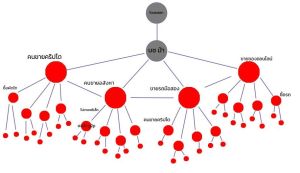บัญชีม้า
Case Studies: Money Laundering with Thai "Mule" Accounts
Thailand's financial system, particularly its fast and accessible online banking, has become a target for money laundering through "grey capital" schemes. Here are some examples of how foreign nationals, particularly from China, might exploit the system:
Scenario 1: Buying Mule Accounts (ซื้อบัญชีม้า)
พระราชกำหนด มาตรการป้องกันและปราบปรามอาชญากรรมทางเทคโนโลยี พ.ศ. 2566 ระบุว่า เจ้าของบัญชีม้า หรือเบอร์ม้า ต้องระวางโทษจำคุกไม่เกิน 3 ปี หรือปรับไม่เกิน 300,000 บาท หรือทั้งจำทั้งปรับ รวมถึงผู้ที่เป็นธุระจัดหา โฆษณา หรือไขข่าวโดยประการใดๆ เพื่อให้มีการซื้อ ขาย ให้เช่า หรือให้ยืม บัญชีเงินฝาก บัตรอิเล็กทรอนิกส์ บัญชีเงินอิเล็กทรอนิกส์ ตลอดจนเลขหมายโทรศัพท์สำหรับบริการโทรศัพท์เคลื่อนที่ ซึ่งลงทะเบียนผู้ใช้บริการในนามของบุคคลหนึ่งบุคคลใดแล้ว แต่ไม่สามารถระบุตัวผู้ใช้บริการได้ ต้องระวางโทษจำคุกตั้งแต่ 2 - 5 ปี หรือปรับตั้งแต่ 200,000 - 500,000 บาท หรือทั้งจำทั้งปรับ
- The Scheme: Criminals purchase bank accounts from Thai citizens, often students or those lured by promises of quick cash. These accounts become "mule accounts."
- The Process: The criminal deposits dirty money into the mule account. The money might come from illegal activities like drug trafficking, Call Center Scams, or embezzlement.
- Laundering with Crypto: The criminal uses the mule account to buy cryptocurrency on a Peer-to-Peer (P2P) exchange or a centralized exchange like Binance.
- Vanishing Act: Once converted to a digital currency like USDT (Tether), the criminal can easily transfer the laundered money anywhere in the world, making it difficult to trace.
Scenario 2: Social Engineering and Binance Borrowing
- The Scheme: The criminal befriends a Thai citizen and convinces them to "borrow" their Binance account or share login credentials.
- The Manipulation: The criminal uses the victim's account to buy and sell cryptocurrency, potentially using it to launder dirty money alongside legitimate transactions. This makes it harder to detect suspicious activity.
- Fast Payments and Exploitation: Thailand's fast online banking system allows for quick money transfers, enabling criminals to move large amounts quickly through the victim's account.
Scenario 3: ATM Disguise and Social Engineering
- The Scheme: Criminals exploit ATM facial recognition technology by disguising themselves as elderly individuals who "struggle" with using the machine.
- The Social Engineering Tactic: They approach unsuspecting people at the ATM, asking for help to withdraw cash, claiming they don't understand the process or have forgotten their glasses.
- The Trap: The account used is a mule account filled with illicit funds. When the helpful stranger withdraws money, they unknowingly become complicit in the money laundering scheme.
- The Risk of Complicity: ATM cameras capture the helper's face and actions. This could link them to the mule account and its illicit funds, potentially leading to civil or even criminal penalties. It can also expose their personal information to authorities.
How to Protect Yourself from ATM Scams
- Be Skeptical of Requests: While it's kind to help others, remain cautious of anyone asking you to perform financial transactions on their behalf. This is a common social engineering tactic.
- Offer Alternative Assistance: Instead of helping them withdraw cash, offer to help them contact their bank or find a bank representative for assistance.
- Report Suspicious Behavior: If you suspect someone is trying to manipulate you at an ATM, report it to the bank immediately and consider contacting the authorities.
How to Protect Your Financial Accounts
Guard Your Information:
- Never share your bank account details or online banking login credentials with anyone, not even friends or "helpful strangers."
- Be wary of offers that seem too good to be true, especially those promising quick money for minimal effort.
Be Alert:
- Monitor your bank statements regularly for any unauthorized transactions.
- If you suspect someone might be using your account for illegal activities, report it to your bank immediately.
Enable Security Features:
- Activate two-factor authentication (2FA) on your bank accounts and cryptocurrency exchanges. This adds an extra layer of security by requiring a code sent to your phone for login attempts.
- Consider using strong and unique passwords for all your online accounts.
Educate Yourself:
- Stay informed about common money laundering schemes. The Bank of Thailand website provides resources and information.
- Talk to friends and family about these risks so they can also protect themselves.
Key Takeaways
These three case studies illustrate how money launderers can exploit Thailand's accessible banking system and the kindness of its citizens. They use various tactics, including:
- Purchasing mule accounts
- Exploiting online financial platforms like Binance
- Preying on social norms and helpfulness through ATM scams
The Importance of Financial Literacy and Critical Thinking
Fighting money laundering requires both individual caution and wider financial awareness. Understanding how these schemes work allows us to identify potential red flags and protect ourselves and others from unwittingly becoming part of illegal activities.
Remember:
- Trust your instincts: If something feels "off" about a transaction or request, it's always best to err on the side of caution.
- Question unusual requests: There are legitimate reasons why someone might need help with financial tasks. However, questioning their motives can help uncover potential deception.
- Know the consequences: Aiding in money laundering, even unknowingly, carries heavy penalties and could damage your reputation.
By combining vigilance, skepticism, and understanding of common scams, you can actively help safeguard Thailand's financial system and protect your own interests.
By following these steps, you can significantly reduce the risk of your financial accounts being used for money laundering. Remember, if something sounds suspicious, it probably is. Don't hesitate to report any concerns to your bank or the authorities.

